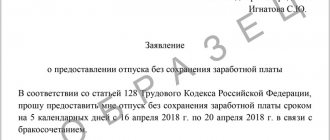Source: Magazine “Human Resources Department of a Commercial Organization”
The director (general director, president, etc.), who is also the head of the organization, like all other employees, has rights granted by labor legislation, including the right to vacation. But since the manager has a number of powers that are granted only to him, during his absence another employee must be appointed to perform the functions of the manager. In the article we will consider the order in which leave is granted to the director, who and how can perform his duties, and how the transfer of powers is carried out.
The manager and his competence
In Article 273 of the Labor Code of the Russian Federation, the head of an organization is characterized as an individual who, in accordance with the Labor Code of the Russian Federation, other federal laws and other regulatory legal acts of the Russian Federation, laws and other regulatory legal acts of the constituent entities of the Russian Federation, regulatory legal acts of local government bodies, constituent documents of a legal entity ( organization) and local regulations manages this organization, including performing the functions of its sole executive body.
The manager is the sole executive body of the company (director, general director, president, etc.), who is elected by the general meeting of the company's participants for a period determined by its charter, unless the charter refers to the resolution of these issues within the competence of the board of directors (supervisory board) of the company. The sole executive body of the company may not be elected from among its participants.
The head of the institution (hereinafter referred to as the director) as an employee is subject to labor legislation, and as an executive body - to civil law. The effect of labor legislation, in particular Ch. 43 of the Labor Code of the Russian Federation , applies to the heads of all organizations, regardless of their organizational and legal forms and forms of ownership, except for those cases when:
- the head of the organization is the only participant (founder), member of the organization, owner of its property;
- The management of an organization is carried out under an agreement with another organization (management organization) or an individual entrepreneur (manager) ( Part 2 of Article 273 of the Labor Code of the Russian Federation ).
In addition, the activities of the director are regulated by the provisions of other laws and regulations applicable to the heads of a particular type of organization. The most common forms of commercial organizations are limited liability companies and joint stock companies. Accordingly, we can highlight federal laws dated 02/08/1998 No. 14-FZ “On Limited Liability Companies” (hereinafter referred to as the LLC Law ) and dated 12/26/1995 No. 208-FZ “On Joint-Stock Companies” .
Individual entrepreneurs in matters of labor activity are guided by the Labor Code.
In accordance with paragraph 4 of Art. 32 and art. 40 of the LLC Law, the competence of the director includes all current issues of managing the company’s activities, if, according to the law or the company’s charter, their decision is not within the competence of the general meeting of LLC participants, the board of directors (supervisory board) and the collegial executive body of the company. Director, in particular:
- acts on behalf of the company without a power of attorney, including representing its interests and making transactions;
- issues powers of attorney for the right of representation on behalf of the company, including powers of attorney with the right of substitution;
- issues orders on the appointment of company employees to positions, on their transfer and dismissal, applies incentive measures and imposes disciplinary sanctions;
- exercises other powers that are not within the competence of the general meeting of the company's participants, the board of directors (supervisory board) of the company and the collegial executive body of the company.
The procedure for the director's activities and decision-making is regulated by the company's charter, internal documents of the company, as well as an agreement concluded between the company and the director.
Sample application p14001 for acting general director
Stage 1 - drawing up documents. To change the CEO you need:
- Draw up minutes of the general meeting of founders or the decision of the sole founder on the election (appointment) of the general director;
- Application for amendments to the Unified State Register of Legal Entities in form P14001.
- clause 1.2 art. 9 Federal Law No. 129 “On state registration of legal entities and individual entrepreneurs” - documents must be notarized. Certification is required by an application form 14001 on amendments to the Unified State Register of Legal Entities. To do this, you need to provide the following list of documents:
- registration certificate
- certificate of registration with the Federal Tax Service
- charter
- decision (minutes) on the appointment of the general director.
- Registration of a change of general director with the Federal Tax Service. The application and decision (protocol) on the appointment of the general director, completed and signed by the applicant, are submitted to the MIFTS. Submission of documents for registration can be carried out exclusively by the applicant (new or old general director). Receipt of documents is possible both by the applicant and by a power of attorney executed on behalf of the company and certified by the seal of the company. A refusal to register may be issued if the new director is already the head of 3 or more companies.
The applicant is given a receipt for receipt of documents indicating the list and date of their receipt by the registering authority. Based on this document, the applicant will subsequently receive a certificate of entry into the State Register.
Dear Colleagues! I am an experienced personnel officer; I have been heading the personnel service of a metallurgical plant for more than ten years. During this time, I was firmly convinced that there are no trifles when working with personnel documents. A seemingly insignificant deviation from the law can come back to haunt you with big troubles: a protracted labor conflict, or even legal proceedings. That’s why it’s so annoying to sometimes come across unprofessional, erroneous recommendations and advice in the literature for personnel officers. Recently I was looking through one authoritative personnel publication, and I came across a sample of an “amazing” order. If you accept his organization in this form, you won't have any trouble. I am sending you a photocopy of it; I think your experts will be interested in getting to know it.
We recommend reading: Help for young families in Volgograd
Registration of director's leave
First of all, let us remind you that the right to use vacation for the first year of work arises for the director after six months of his continuous work with this employer. By agreement of the parties, paid leave can be provided before the expiration of six months ( Article 122 of the Labor Code of the Russian Federation ).
The order of provision of paid vacations is determined annually in accordance with the vacation schedule approved by the employer, taking into account the opinion of the elected body of the primary trade union organization no later than two weeks before the start of the calendar year in the manner established by Art. 372 of the Labor Code of the Russian Federation for the adoption of local regulations ( Article 123 of the Labor Code of the Russian Federation ).
The director must be notified of the start time of the vacation against signature no later than two weeks before its start.
And here the question immediately arises: what document is used to document the director’s leave and who signs this document? It all depends on whose competence it is to grant leave to the director. If it is within the competence of the founders of the company, then the granting of leave is formalized by the minutes of the general meeting of the company's participants (a decision of one participant) and an order drawn up in any form and signed by a person authorized by the founders. Why in any form? Because an order drawn up according to the unified T-6 form can only be signed by the head of the organization or the person performing his duties.
If granting leave to a director is within the competence of the founders of the company, it seems that initially, before drawing up the vacation schedule, the director must agree with the founders on the estimated date of his leave.
For your information
By virtue of Art. 33 of the LLC Law , the competence of the general meeting of the company’s participants includes, in particular, the formation of the executive bodies of the company and the early termination of their powers, if the company’s charter does not include the resolution of these issues within the competence of the board of directors (supervisory board) of the company. As for the powers to resolve other issues related to the activities of the manager, including the provision of leave, they can be determined by the charter of the company.
If the provision of leave is within the competence of the director himself, then everything is much simpler. The director issues an order granting leave and signs it himself.
If, due to production needs, it is necessary to recall the director from leave, then (again, depending on whose competence it is to grant leave to this employee), the recall is carried out by the founders of the company on the basis of a protocol (decision) and order, or by the director himself, who himself draws up and signs an order for early departure from vacation.
For your information
The director's recall from vacation is permitted only with his consent. The part of the vacation not used in this regard must be provided at the director’s choice at a time convenient for him during the current working year or added to the vacation for the next working year ( Article 125 of the Labor Code of the Russian Federation ).
Is it possible to write an application for an interim general director?
This action is regulated by Article 74 of the Labor Code of the Russian Federation and can be carried out by temporary transfer to another position or without interruption from the main activity, as well as by formalizing a fixed-term employment relationship with an outside person. Depending on the specific situation, the replacement is documented. You will need
- - written consent of the employee
- -order
- - application (when receiving an outsider)
- -fixed-term contract
- -order
Transfer of powers of the director
So, before going on vacation, the director must transfer his powers to another employee, who will manage the organization instead: sign employment contracts with new employees, contracts with contractors, accounting and tax reporting documents, etc. In addition, it is possible , you will have to represent the organization in government bodies, courts, etc. First, the director must issue an order on the temporary performance of the duties of a manager by his replacement employee.
We provide a sample of such an order on page .
You should also issue a power of attorney to transfer part or all of the director’s powers. There can be one power of attorney for the transfer of both internal powers and external ones - for representing the interests of the organization before third parties (in other companies, government bodies and courts), or there can be several.
| Limited Liability Company "Alliance" Alliance LLC ORDER on assignment of responsibilities Krasnodar March 25, 2015 Due to another vacation I ORDER: to assign the duties of director to Deputy Director V.P. Kornilov during my vacation - from March 30 to April 13, 2015. Director Alexandrov V.P. Alexandrov |
Some experts propose to delegate the powers of a director within the organization by means of an order listing all delegated powers, and to third parties - by a power of attorney. There is no fundamental difference here, and we believe that powers exercised within an organization can be formalized either by order or by power of attorney. Here is a sample order.
| Limited Liability Company "Alliance" Alliance LLC ORDER on the transfer of powers Krasnodar March 25, 2015 Due to another vacation I ORDER:
Director Alexandrov V.P. Alexandrov |
As for representing interests in other organizations, a power of attorney is required.
In this case, it is not necessary to issue a notarized power of attorney. A power of attorney on behalf of a legal entity is issued signed by its director or another person authorized to do so in accordance with the law and constituent documents ( Part 4 of Article 185.1 of the Civil Code of the Russian Federation ). In this case, the organization’s seal may not be affixed. However, in some cases, for example, for participation in civil and arbitration proceedings, the signature of the principal must be certified by the seal of the organization ( clause 3 of article 53 of the Civil Procedure Code of the Russian Federation, clause 5 of article 61 of the Arbitration Procedure Code of the Russian Federation ).
The power of attorney is issued on the company's letterhead, which contains its basic details. The power of attorney should indicate the date of issue, the validity period of the power of attorney, the person issuing the power of attorney (director), the person to whom the power of attorney is issued (representative), the powers being transferred and the signature of the principal.
To represent the interests of the organization in other institutions, in order to avoid misunderstandings, we recommend that when formulating such authority not to use the phrase “to represent the interests of the Company in any enterprises, institutions, organizations, regardless of their form of ownership,” but to indicate specific government institutions, for example: “... to represent the interests of the Company in tax authorities, state extra-budgetary funds, internal affairs bodies and other institutions and organizations, regardless of their form of ownership, and perform all actions related to representing the interests of the Company in these bodies, institutions and organizations.”
Sample application p14001 for acting general director
If, to perform the duties of a temporarily absent employee, an outsider is hired, regular employment is drawn up under a fixed-term contract, indicating the beginning of the employment relationship and its end. 6 The applicant must submit an application for temporary work. You will also need a work book, education documents, TIN, pension insurance certificate and other documents, depending on the specifics of the work. 7 The employer issues an order for temporary employment, indicating all conditions of employment. 8 It is impossible to assign duties to vacant, elective, or competitive positions. When registering labor relations with these employees, there must be a clause on the procedure for their replacement, indicating several deputies, like deputies, an entry in the employment contract about the procedure for performing duties and working conditions during the replacement.
And the employee to whom it was issued has the right to refuse it at any time. An exception is the case when an irrevocable power of attorney is issued (clause 2 of Article 188 of the Civil Code of the Russian Federation). Such a power of attorney can be revoked only in those cases that are expressly indicated in the document itself (Art.
Methods for replacing a director
We have sorted out the transfer of powers.
However, in addition to this, the replacement of the director’s position should be documented. And depending on the replacement method, there are several design options. Let's look at them. 1. The director has a full-time deputy and the duties of the replacement are specified in his employment contract and job description. Some experts believe that in this case there is no need to issue an order and draw up a power of attorney. But we think differently: regardless of whether the duties for replacing the director are specified in the employment contract, job description, both the order and the power of attorney are needed. At the same time, it is enough to issue them once, and not every time when the director goes on vacation, because in addition to vacation, he may be on sick leave, on a business trip, etc. The order states that the performance of the duties of the director is assigned to the deputy director during his absence .
2. The duties of the director are performed by another employee of the organization in a combination of positions.
According to Art. 60.2 of the Labor Code of the Russian Federation, with the written consent of the employee, he may be entrusted with performing, during the established duration of the working day, along with the work specified in the employment contract, additional work in a different or the same profession (position) for an additional fee.
The combination is formalized by concluding an additional agreement to the employment contract, which establishes the period during which the employee will perform additional work, its content and volume, as well as the amount of additional payment.
Thus, when combining the position of director, the following documents are required: the employee’s written consent to combine the position of director, an agreement to the employment contract, an order to perform the duties of a director in order to combine positions, a power of attorney for the transfer of powers.
In addition to part-time work, the Labor Code also provides for such a form of performing other work as part-time work - performing, in free time from the main job, another regular paid job for the same employer (internal part-time work) and (or) for another employer (external part-time job) ( Article 60.1 Labor Code of the Russian Federation ). However, we will not consider this method, since this form of filling the position of director is not used in practice.
3. The duties of the director are performed by another employee of the organization by way of temporary transfer.
By virtue of Art. 72.2 of the Labor Code of the Russian Federation , by agreement of the parties, concluded in writing, an employee may be temporarily transferred to another job with the same employer for a period of up to one year, and in the case where such a transfer is carried out to replace a temporarily absent employee, for whom, in accordance with the law, the place of work is retained until the employee returns to work. According to Part 1 of Art. 72.1 of the Labor Code of the Russian Federation, transfer is permitted only with the written consent of the employee, with the exception of certain cases established by Art. 72.2 Labor Code of the Russian Federation .
Thus, when transferring an employee to the position of director, the employee’s written consent, an additional agreement to the employment contract, an order for temporary transfer to the position of director during his absence, and a power of attorney are also required.
Let us remind you that according to Part 1 of Art. 72.2 , if at the end of the transfer period the employee’s previous job is not provided, and he did not demand its provision and continues to work, then the condition of the agreement on the temporary nature of the transfer loses force and the transfer is considered permanent.
4. The duties of the director’s position are performed by an external employee under a fixed-term employment contract. Let’s say right away that this method is usually used when the director goes on long leave, for example, for maternity or child care.
In this case, a fixed-term employment contract is concluded for the duration of the duties of the absent employee, who, in accordance with labor legislation and other acts containing labor law norms, a collective agreement, agreements, local regulations, and an employment contract, retains his place of work ( Article 59 of the Labor Code of the Russian Federation ).
There is no need to draw up other documents in case of concluding a fixed-term employment contract, since the employee is already accepted to the position of director with all the relevant powers.
Working hours
The temporary replacement regime assumes normal working hours. That is, the employee performs additional work along with the main work during the working day (shift) assigned to him. This is stated in Part 1 of Article 60.2 of the Labor Code of the Russian Federation.
The combination means that the employee chosen by the employer simultaneously performs both his own work and the work of a colleague who has gone on vacation (Article 60.2 of the Labor Code of the Russian Federation).
Combination during vacation is possible only with the consent of the employee who is planned to be entrusted with performing the work duties of the vacationer.
Silk Road LLC
Against combination
Substitution during vacation is the transfer of an employee to the place of a vacationer (Article 72.2 of the Labor Code of the Russian Federation). Those. The employee does not perform his job duties while replacing the vacationer, but only performs the work of the employee who went on vacation.
The temporary transfer of an employee is formalized by a written agreement between the employee and the employer. Such an agreement can be made by analogy with a part-time agreement, replacing the information in it with information suitable for a specific situation (for example, indicating the amount of salary for the period of substitution, as well as information that during the period of substitution the employee performs only the work of a vacationer).
Unlike part-time work, part-time work is additional work that one employee performs during the absence of another, along with his main responsibilities.
This personnel change has its own nuances:
- carried out only within one enterprise;
- allows you to combine not only similar positions, but also responsibilities in other professions;
- the performance of duties is carried out in parallel with one’s work within the established working hours;
- mandatory requires bilateral consent;
- accompanied by an order from the manager and an additional agreement;
- paid by the employer;
- legally, both parties have the right to terminate the agreement early with prior warning to the opposite party.
Many employers, along with an annual vacation schedule, draw up a spontaneous combination schedule. Already at the beginning of the calendar year, a list of job responsibilities is prepared that cannot fail to be performed in order to obtain effective results from the company.
Additionally, the estimated amounts to pay for combined workers going on vacation are calculated. Calculated planned payments are included in the organization’s budget for the year. The planned amount is slightly overestimated, since they take into account that during the year staff get sick, study, etc.
We invite you to familiarize yourself with: Power of attorney for the right to sign primary documents: sample
Salary for the position being filled
Due to the complexity of the work, increased responsibility and the amount of work performed by the deputy during the absence of the director, he must receive appropriate payment for his work.
Increased pay is provided for by the Labor Code. So, according to Art. 151 of the Labor Code of the Russian Federation, when combining professions (positions), expanding service areas, increasing the volume of work, or performing the duties of a temporarily absent employee without release from work specified in the employment contract, the employee is paid additionally. In this case, the amount of additional payment is established by agreement of the parties to the employment contract, taking into account the content and (or) volume of additional work.
When performing the duties of a director during a temporary transfer, remuneration is determined by agreement of the parties, but, as a rule, it is set in the amount of wages for the position held.
As for the full-time deputy, according to the Explanations on the procedure for paying temporary replacements dated December 29, 1965 No. 30/39 , approved by the Decree of the State Labor Committee of the USSR and the Secretariat of the All-Union Central Council of Trade Unions and in force to the present time (hereinafter referred to as the Explanations ), the employer must pay the employee temporarily performing the duties of an absentee, in including a full-time deputy, the difference in salaries.
Thus, no matter how the director is replaced, the salary of the employee replacing him must be no less than the director’s salary.
In this case, substituents according to paragraph. 6 clause 1 of the Explanations bonuses are awarded according to the conditions and in the amounts established by the position of the replaced employee. For the difference in salaries, a bonus is calculated in the same manner as for an additional payment for combining positions.
Application form with assignment of duties during vacation
In accordance with Art. 21 of the Labor Code of the Russian Federation (hereinafter referred to as the Labor Code of the Russian Federation), an employee has the right to rest, including vacation. Chapter is devoted to vacations. 19 Labor Code of the Russian Federation. In accordance with Art. 114 of this chapter, citizens are granted annual leave while maintaining their place of work and average earnings.
Read more about applying for leave and the possibility of calling an employee back from it in our materials:
When an employee goes on vacation, the question often arises as to who will perform the functions assigned to him during this period.
The application form for leave with assignment of duties to another employee can be downloaded from the link: Application for replacement during leave - sample.
The legal regime of substitution and the need to prepare other documents, in addition to the above statement, depend on whether the replacing employee is or is not released from performing his main duties during the vacation of the employee he is replacing.
The Labor Code of the Russian Federation contains the following rules on this issue:
- For cases where the replacement employee continues to perform his work - Art. 60.2, 151 Labor Code of the Russian Federation.
- For cases when a replacement employee is released from his main job - Art. 72.2 Labor Code of the Russian Federation.
Next, we will analyze these cases and their design separately.
What is important in the document?
Regarding his own leave, the employee writes a corresponding application addressed to the director , indicating in the text what type of leave he is applying for - with or without pay. Office memos (usually also addressed to the head of the enterprise) are issued if it is necessary to urgently recall a person from vacation - and then it is necessary to indicate why.
Or if we are talking about who to shift your job responsibilities to - and this also needs to be justified.









